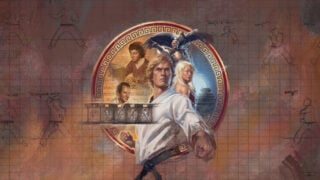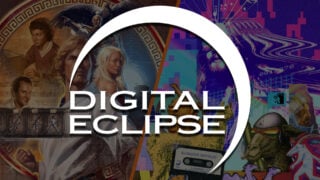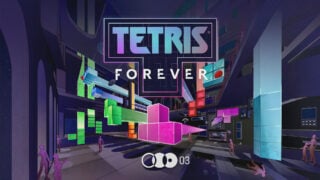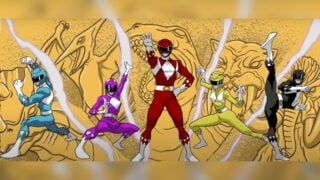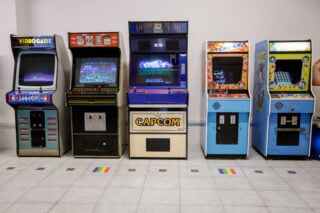VGC’s Developer of the Year 2024 is Digital Eclipse
This year the Atari-owned retro studio enjoyed its best run of form
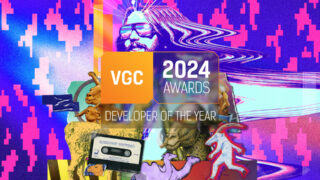
Back in 2015, Frank Cifaldi stated that he wanted Digital Eclipse to become the video game equivalent of the Criterion Collection. At the time, Digital Eclipse had just been newly reformed, and was releasing its first game as a new company, so Cifaldi’s goal was a lofty one.

Cifaldi may no longer be with the studio – after founding the Video Game History Foundation in 2016, he moved over to work on that full-time in 2020 – but that vision has remained its cast-iron foundation in the decade since its reformation.
Rather fittingly, to sum up what Digital Eclipse has accomplished this year, we have to first look back at how it got here. For the uninitiated, Digital Eclipse has existed in some form since the mid ‘90s, where it was making retro compilations at a time when ‘retro’ video games were barely a thing.
With its Arcade’s Greatest Hits collection it ported ‘classic’ Williams, Atari and Midway arcade games to systems like the SNES and PlayStation back when those games were little more than a decade old: the equivalent of releasing a PS3 game on modern hardware today.

The studio would go on to find new success in the Game Boy Color days with a bunch more retro ports and some original games based on licensed IP, then a 2003 merger saw it becoming part of Backbone Entertainment, where the retro re-releases continued, most notably on the Xbox 360’s Live Arcade service.
When things went pear-shaped for Backbone it looked like the end of the journey, but in 2015 a new Digital Eclipse was formed – with original founder Andrew Ayre teaming up with Cifaldi and previous studio head Mike Mika – and the journey to become gaming’s Criterion Collection started.
It goes without saying that Digital Eclipse isn’t the only game in town when it comes to retro re-releases, but where it differs from others (particularly in the past few years) is its strong focus on supporting its content with context.
“It goes without saying that Digital Eclipse isn’t the only game in town when it comes to retro re-releases, but where it differs from others (particularly in the past few years) is its strong focus on supporting its content with context.”
Since its return in 2015, never has Digital Eclipse simply rounded up a bunch of old game ROMs, bundled them with an emulator, designed a menu and slapped a price tag on it. Every retro release it’s handled has come with supporting material giving players an insight into the creation of those games.
Whether it was its collaborations with Capcom (Mega Man Legacy Collection, The Disney Afternoon Collection, Street Fighter 30th Anniversary Collection) or with SNK (SNK 40th Anniversary Collection, Samurai Shodown NeoGeo Collection), the studio has always jammed in any content it can – not just concept art, which you see in many modern games, but design documents, developer interviews, anything the team can get its hands on.

As commendably comprehensive as these compilations were, they’re comparatively concise when put next to Digital Eclipse’s most recent accomplishment, its Gold Master Series.
Technically beginning in 2022 with the release of Atari 50 (though this wasn’t officially part of the series), Digital Eclipse decided to present its retro collections as a historical narrative, choosing to refer to them as interactive museums.
Players work their way through a series of timelines covering different parts of the subject’s history, reading information, looking at photos, flicking through design documents and watching archive video and newly filmed interviews along the way. Then, when the timeline reaches a game – be that an official release or, often, a prototype – the player is able to play that game before returning to the timeline to continue the story.
The most impressive thing about doing it this way isn’t just the dedication to educating the player about the history of video games, but the way in which these games – some of which are nearly half a century old – are made more entertaining by explaining their place in gaming history beforehand.
“The most impressive thing about doing it this way isn’t just the dedication to educating the player about the history of video games, but the way in which these games – some of which are nearly half a century old – are made more entertaining by explaining their place in gaming history beforehand.”
We’ve played numerous Atari compilations over the years but they all tended to fire out 50 or so old Atari 2600 games and expected the player’s sense of nostalgia to carry them through, even though – and we say this with undying respect – they’re cave paintings to younger generations.
Last year, Digital Eclipse followed up Atari 50 with The Making of Karateka, the first in what it calls the Gold Master Series. Using the same timeline format, it follows the story of Karateka, the game made by Jordan Mechner before he would go on to create Prince of Persia. No release had ever explored the development of a single classic video game to this extent, making it an absolute must-have for anyone with an interest in the craft.

The secret sauce here is the commitment the studio has to editorial. Anyone can gather a bunch of photos and arrange them in chronological order, but by hiring Chris Kohler – a veteran games journalist who started back in 1996 and has a string of previous publications longer than your local library – and making him the studio’s editorial director, it also added the backbone (for want of a better word) of the Gold Master Series.
The Gold Master Series marks the future direction of Digital Eclipse. It’s here where Cifaldi’s dream of being the Criterion Collection – the definitive word on the classics – has started to form. And this year the scope of the series became even clearer when it released Volume 2 and 3, both of which were very different.
Back in March we got the second Gold Master Series title, Llamasoft: The Jeff Minter Story. Focusing on the life of British designer Minter and the first half of his career starting from the ZX81 and going all the way up to the Atari Jaguar, it’s a brilliantly detailed (and fully playable) biography of a man who deserves more credit outside of his native UK.
The dedication to making this anthology as complete as it could be extends to the fact that Digital Eclipse even managed to recreate one of Minter’s demos running on the Konix Multisystem, an infamous UK console that was never released. To actually be able to play a Konix game for the first time ever is a moment some retro fans (including this writer) never thought they’d get to experience.

The Jeff Minter Story also showed a refreshing willingness to explore the wider history of video games rather than the US-centric narrative that has formed over the decades.
At a time when the US was suffering its infamous video game crash, Minter and his peers were pioneering a thriving computer game industry in Europe, something often ignored in online retellings of the medium’s formative years.
It would be all too easy to cover well-trodden American or Japanese territory when looking for subjects for its interactive museums, but by focusing on Minter, the studio showed that its passion for education is as important as that of entertainment.
“We’re not selling people the game, we’re selling you the history lesson, we’re selling the experience,” Kohler told us in an interview earlier this year (which is well worth a read if you want more insight into the studio’s ethos).
Not content with giving us just one Gold Master Series title this year, Digital Eclipse then went one better with the release of Tetris Forever in November. While the history of Tetris is one of those well-trodden stories we just referred to, by this point the studio had found its stride with its digital museum format.
With new and extensive interview videos with some of the major names including its creator Alexey Pajitnov and rights-hunter Henk Rogers, Digital Eclipse does a magnificent job of retelling a fascinating story.
Its dedication to going above and beyond the call of duty was also made clear with its recreations in this release. Unable to secure the rights to add the Nintendo-published Game Boy version of Tetris to the list of playable games in its compilation, the studio decided to recreate it, offering a ‘1989 version’ that to all intents and purposes plays just like it.

What’s more, with no stable emulator available for the Russian Electronika 60 computer the original Tetris was made for, Digital Eclipse instead took the known footage of Pajitnov’s original version from previous documentaries about the game, and used that to reconstruct it from scratch, giving a near-perfect replica of a game running on a 1978 Soviet computer.
Llamasoft: The Jeff Minter Story and Tetris Forever earned scores of 4 and 5 stars respectively on VGC, and an Anniversary Edition of Worms Armageddon – complete with museum mode covering the entire history of the series, naturally – only added to the studio’s accomplishments this year. It wasn’t done, however.
Just earlier this month, Digital Eclipse rounded off an impressive 2024 with Mighty Morphin Power Rangers: Rita’s Rewind, an entirely original beat ‘em up designed in the style of a 16-bit era arcade brawler and another 4-star VGC review. It’s a genuinely brilliant game, proving the developer is as accomplished at developing its own new games as it is at curating older ones.
With a 5-star review and two 4-star reviews under its belt, Digital Eclipse has objectively nailed 2024. Now that its Gold Master Series formula is locked down we’re excited to see what other designers, developers and franchises it has lined up for future editions, while games like Rita’s Rewind show it’s no slouch when left to its own devices either.
Frank Cifaldi’s dream of making a Criterion Collection for video games has been joined by another one – increasing the player base of retro game enthusiasts.
“Ultimately, if all we’re doing is taking old games and repackaging them for the people that already love them, we’re just circling the drain, because there’s not going to be enough of those people,” Kohler told us earlier this year. “And so we must create new fans.”
He added: “As a video game collector, I understand that I want to collect something once I become aware of how cool it is. And so people are going to want to play games once they become aware of how interesting they are. But you have to create that awareness somehow.”
With Tetris Forever in particular, that awareness will undoubtedly have grown, and if Digital Eclipse can continue this run into 2025 and beyond, that can only be a good thing for the preservation of not just this medium we all adore so much, but the stories behind it.





